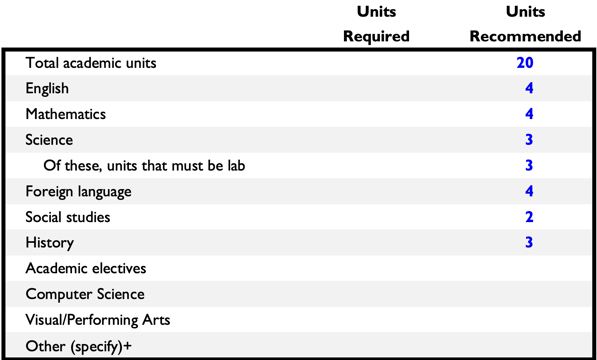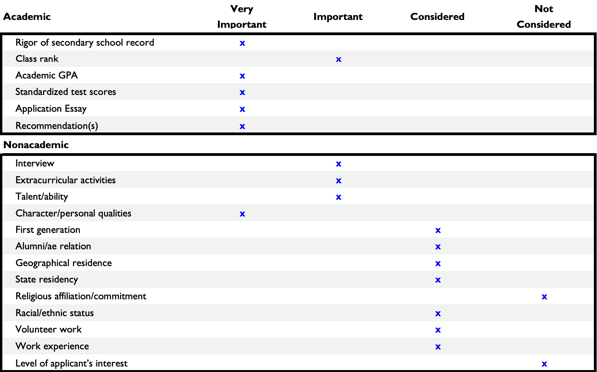University of Pennsylvania Admissions Profile

Introduction
The University of Pennsylvania, a prestigious Ivy League institution located in Philadelphia, Pennsylvania, stands as a beacon of academic excellence, innovation, and interdisciplinary learning. Students from all corners of the globe aspire to be part of the vibrant Penn community and contribute to its legacy of impactful research and intellectual growth. In this comprehensive article, we delve into the University of Pennsylvania admissions profile, shedding light on the key factors that shape the application process, the qualities Penn seeks in its applicants, and valuable insights for prospective students. If you're ready to embark on a journey of academic discovery and personal growth, read on to uncover the secrets behind Penn's admissions process.
University of Pennsylvania Admissions Profile
The University of Pennsylvania, known as Penn, has a highly selective admissions process that considers various aspects of an applicant's profile. Understanding the University of Pennsylvania admissions profile is crucial for prospective students aiming to secure a place at this esteemed institution. Let's explore the essential components of the University of Pennsylvania admissions profile to gain valuable insights into the application process.
Below are tables highlighting how UPenn evaluates each applicant through information published in the Common Data Set, a resource that compiles a standardized list of data items provided by universities about their admissions profiles.
Distribution of high school units required and/or recommended

Relative importance of each of the following academic and nonacademic factors in first-time, first-year, degree-seeking
(freshman) admission decisions

SAT and ACT Policies

Academic Excellence: A Strong Foundation
The University of Pennsylvania places significant emphasis on academic excellence. The admissions committee evaluates an applicant's high school academic record, including course selection, grades achieved, and overall GPA. Penn seeks students who have excelled in challenging coursework, demonstrated intellectual curiosity, and shown a passion for learning. Strong performance in core subjects, as well as in areas aligned with the applicant's intended field of study, can positively impact their candidacy.
Standardized Test Scores: Demonstrating Aptitude
Standardized test scores, such as the SAT or ACT, play a role in the evaluation process at the University of Pennsylvania. While Penn takes a holistic approach to admissions, strong performance in standardized tests can enhance an applicant's profile. High scores in critical reading, writing, math, and relevant subject tests can demonstrate an applicant's academic abilities and potential for success at Penn.
Extracurricular Engagement: Pursuing Passions and Impact
Penn values applicants who have shown engagement and leadership in extracurricular activities. Participation in clubs, sports, community service, research projects, or other pursuits showcases an applicant's diverse interests, passion, and commitment to making a positive impact. Penn seeks individuals who have made meaningful contributions, demonstrated leadership potential, and shown a capacity for collaboration.
Personal Essays: Expressing Personal Narratives
The personal essays provide applicants with an opportunity to express their unique perspectives, experiences, and aspirations. Penn values authentic and thoughtful responses that reflect an applicant's voice, intellectual curiosity, and personal growth. Through the essays, applicants can articulate their motivations, goals, and their alignment with Penn's values and mission. Well-crafted essays that showcase critical thinking and self-reflection can significantly strengthen an applicant's candidacy.
Supplemental Essays in the University of Pennsylvania's Admissions Process
The University of Pennsylvania (Penn) requires supplemental essays in addition to the Common Application or Coalition Application essay. These supplemental essays are an essential part of Penn's holistic admissions process, offering applicants an opportunity to showcase their personality, intellectual curiosity, and fit with the Penn community.
For the 2023-2024 admissions cycle, Penn requires all applicants to answer a specific prompt about their interest in their chosen undergraduate school at Penn. Here's a closer look:
Penn-Specific Essay
This essay, with a recommended length of 450-600 words, is essentially a 'Why Penn?' essay. Applicants are asked to discuss their academic interests and how they plan to pursue them at Penn. This question aims to assess an applicant's fit with their chosen program and their potential to contribute to the academic community.
Applicants should research the specific opportunities available within their chosen school and program at Penn, and then detail how these opportunities align with their academic and career goals. This could include specific courses, research opportunities, faculty, internships, or extracurricular activities.
Penn is looking for students who have a clear understanding of the opportunities the university provides and who are excited to take full advantage of them. Therefore, applicants should aim to demonstrate both their passion for their chosen field and their understanding of how Penn's specific offerings will help them explore that passion.
Some of Penn's specialized programs, such as the Huntsman Program in International Studies & Business or the Seven-Year Bio-Dental Program, have additional essay requirements. These prompts ask applicants to delve into their reasons for choosing these unique interdisciplinary programs, and how they intend to engage with the specific opportunities provided by the programs.
In all supplemental essays, Penn appreciates students who are genuine, thoughtful, and detailed. Applicants should take this opportunity to demonstrate their fit with Penn's rigorous academic programs and vibrant community, and how they intend to make a positive impact on the Penn community.
Sample Essays
Prompt: Considering the specific undergraduate school you have selected, how will you explore your academic and intellectual interests at The University of Pennsylvania?
Answer:
“Arnav, we want you to apply”, I received this email from Penn and DASHED to tell mum. My naïve self had forgotten I had checked the ‘Student-Search-Service’ box, and schools could send system-generated emails predicated on my SAT scores.
This pure, childlike delight was out of my sheer obsession with Penn. When my senior at school got in here last year, I pestered him all year long trying to know HOW. Tireless researching, approaching hundreds of alumni on Reddit, watching EVERY millisecond of YouTube advice, and painting a life-size Quaker on my bedroom walls only to miss the ED deadline by falling to pneumonia: Regardless of these setbacks, I sported an impending dream.
At Penn, I intend to revitalize this dream through the College of Arts and Sciences. Classes like “Political Journalism at the Crossroads” and “Queer Theory” blend my love for English and politics which I will reflect through writing for Penn’s signature magazine- The Pennsylvania Gazette. At the Penn Institute of Urban Research and CAS, I aim to make the best use of Summer Humanities Internships (SHIP) and Global Research Internship Programs (GRIP) to finance my collaborative research in the Public Affairs domain. I’ll also sign on for the Penn Debate Society (PDS), and collaborate with TEDxPENN to hear budding speakers from different walks of life. As perhaps my country’s most accomplished debater, I vow to make this my personal goal to lead our team to total victory at the World Universities Debating Championship (WUDC) that Penn has dreamed of winning since 1981. To further my progress with the fight against child labor, I shall assist and seek assistance of a like-minded student-body via the Barbara and Edward Netter Center for Community Partnerships.
For someone who’s obsessed with rhetoric, I totally understand the definition of an ‘agreement’. In our context, an agreement would be a two-way street where I avail facilities Penn offers while adding to its community, campus, and unwavering prestige. As I pack my bag with all essentials- my brain, my grit, and my quirky self- I complete one half of the agreement.
Dear Penn, I now wait for you to hand me that beautiful letter as we seal our deal.
Prompt: Considering the specific undergraduate school you have selected, how will you explore your academic and intellectual interests at the University of Pennsylvania? For students applying to the coordinated dual-degree and specialized programs, please answer these questions in regard to your single-degree school choice; your interest in the coordinated dual-degree or specialized program may be addressed through the program-specific essay.
Answer:
I always loved watching the worms when it rained. I used to put my little raincoat on, sit on the doorsteps, and watch them move toward the puddles. My younger brother, forever intent on destroying the world around him, would try to stomp on the worms, and I would run after him screaming. In my imagination, the brain looked like a pile of squiggly worms. However, my neuroscience curiosity has since grown beyond a worm’s habits.
For example, my mother thought that I was insane when I wanted to watch American Murder: The Family Next Door. To her immense relief, I was interested in the psychology of the criminal rather than the crime itself. Although neuroscience is my primary interest, I also hope to learn more about the intersection between law and medicine at the UPenn College of Arts and Sciences. I’ve been able to explore this topic through various projects at school such as presentations on juvenile crime and the death penalty.
At the University of Pennsylvania, I look forward to taking classes like Forensic Neuroscience (BIBB 050) as well as Neuroscience and Society (PSYC 247) both of which directly combine my two interests. Hopefully, the Take Your Professor to Dinner program resumes as I would make sure to talk to Dr. Daniel Langleben about his research on forensic functional brain imaging over a meal of Philly cheesesteaks.
I also hope to participate in the Race, Science, and Society Program where I can discover how race biases and neuroscience go hand-in-hand and contribute to the fight against racism. The Beyond Arrests: Re-Thinking Systematic-Oppression Group immediately caught my attention while looking at Penn’s opportunities to engage in relevant dialogue. My fascination with the criminal system began with reading Fyodor Dostoevsky’s Crime and Punishment, and Penn will both fuel that curiosity as well as introduce new questions about the world of justice reform.
As an eight-year Latin scholar and a five-time reader of the Percy Jackson franchise, I would like to take classes in the Penn Classical Studies department where I can learn more about the impact of ancient cultures on society today. Classes such as Greek and Roman Medicine (CLST 271) would intersect my interests in medicine and classical civilizations.
Although I do harbor a deep love for Philly cheesesteaks and enjoyment of running in strange places like the Woodlands Cemetery, the range of programs to support my diverse interests and unmatched opportunities to put learning into action make me confident that the University of Pennsylvania is the best university for me to succeed.
Letters of Recommendation: Insights from Others
Letters of recommendation offer valuable insights into an applicant's character, abilities, and potential for success. Penn typically requires two letters of recommendation, often from teachers or mentors who can speak to an applicant's academic achievements, personal qualities, and potential contributions to the Penn community. Selecting recommenders who know the applicant well and can provide specific examples of their strengths is crucial.
Demonstrated Impact: Making a Difference
Penn values applicants who have made a positive impact in their communities and beyond. Engaging in extracurricular activities, community service, research projects, or initiatives that address societal challenges showcases an applicant's commitment to making a difference. Penn seeks individuals who demonstrate leadership, resilience, and a desire to contribute to the betterment of society.
University of Pennsylvania Application Deadlines
Navigating the application process at the University of Pennsylvania (Penn) requires careful attention to the various deadlines. Penn offers three application plans: Early Decision (ED), Regular Decision (RD), and QuestBridge National College Match. Each plan has a distinct timeline, providing flexibility for applicants.
Early Decision
Penn's Early Decision program is a binding agreement, meaning that students commit to attend Penn if they are admitted. The Early Decision deadline at Penn is November 1. This plan is designed for students who have determined that Penn is their first choice. Decisions are typically released by mid-December.
Regular Decision
The Regular Decision deadline at Penn is January 5. This gives applicants more time to assemble their applications and allows them to include accomplishments from the first half of their senior year. Decisions are generally announced by the end of March, and students have until May 1 to respond to their offer of admission.
QuestBridge National College Match
Penn is a partner with QuestBridge, a national program that connects high-achieving, low-income students with leading institutions. The application deadline for this program is typically in late September, and students find out if they are finalists by late October.
Financial Aid Application
Applicants seeking financial aid must submit the FAFSA, the CSS Profile, and federal income tax returns. The deadline for these materials is November 2 for Early Decision and February 1 for Regular Decision. Penn is committed to meeting 100% of demonstrated need for all admitted students.
It's important to note that all application materials must be submitted by 11:59 PM Eastern Standard Time (EST) on the respective dates.
Understanding and adhering to these deadlines is crucial for a smooth application process at Penn. By managing their time effectively, students can ensure they present a compelling application that accurately represents their abilities, experiences, and fit with the Penn community.

Frequently Asked Questions
What is the acceptance rate at UPenn?
The acceptance rate at the University of Pennsylvania is typically around 8-9%, making it a highly competitive institution.
Does UPenn require interviews for all applicants?
Does UPenn consider demonstrated interest in admissions decisions?
The University of Pennsylvania takes a holistic approach to admissions and does not formally track demonstrated interest. Admissions decisions are primarily based on an applicant's qualifications, achievements, and fit with the university's academic community.
Conclusion
Securing admission to the University of Pennsylvania requires a combination of academic excellence, extracurricular engagement, and a commitment to making a positive impact. By understanding the various components of the University of Pennsylvania admissions profile and showcasing your unique strengths, you can increase your chances of joining the esteemed Penn community. So, dare to dream big, think critically, and let your passion for knowledge and innovation guide you toward unlocking the doors to academic and personal success at the University of Pennsylvania.
